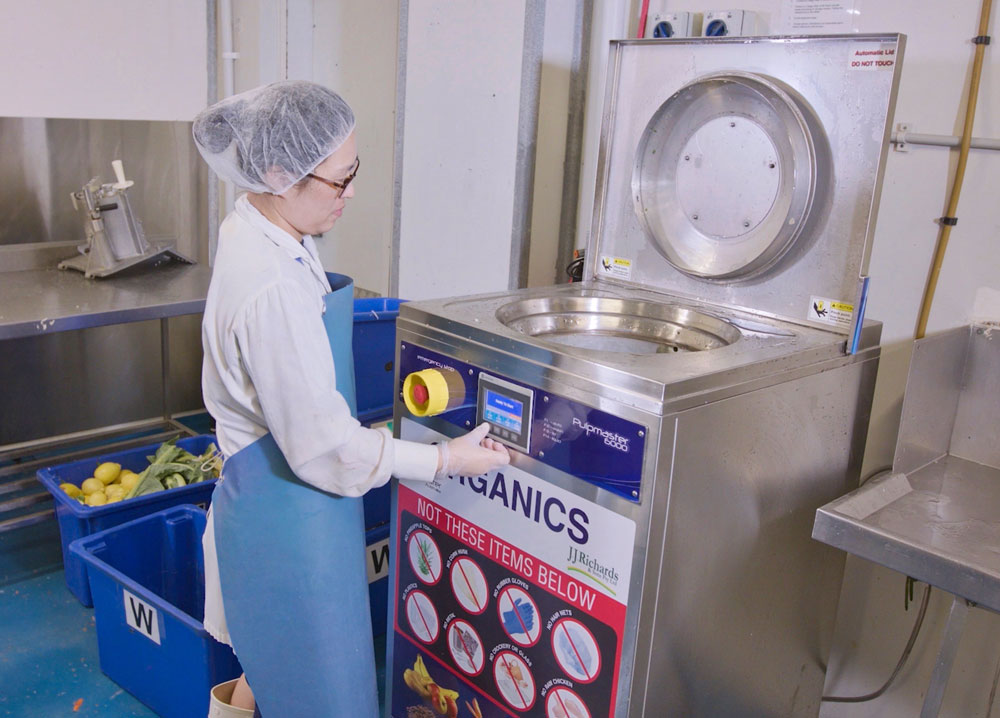How it Works
How does the Pulpmaster System work?
The Pulpmaster product demonstration
The Pulpmaster food waste management process
Waste management is a global environmental and financial concern. Finding ways to divert waste from landfill is becoming increasingly important. The Pulpmaster is an innovative solution that turns food waste into sustainable organic fertilizer and green energy.
How does the Pulpmaster system work?
Step 1
Cafes & Restaurants, Commercial Kitchens and Fruit & Vegetable Shops all generate large volumes of food waste.
Step 2
This food waste is collected by way of our lightweight storage bin system, making it easy to maneuver on-site food waste transportation.
Step 3
After collection, food waste is tipped into the Pulpmaster drum.
The user presses the Auto Start cycle button. The lid will automatically close, making the unit completely safe as it goes to work.
Step 4
The food waste is macerated and turned into a pulp inside the machine before being pumped into a holding tank. The Pulpmaster can process up to 264 gallons of organic waste in just 20 minutes.
Step 5
When the holding tank is nearing full, an automated email is sent to JJ’s Waste, who will then arrange to collect the pulp from the holding tank.
Step 6
The organic pulp is a suitable feedstock for anaerobic digestions, generating biogas for renewable energy generation. In addition, we also take the pulp to an organics recycling facility where it is turned into organic fertilizer. The organic product created from Pulpmaster plays an important role in the life cycle of healthy, organic crops by improving soil conditions and nutrient levels.
Step 7
Products grown with Pulpmaster fertilizers are healthy and organically fed products that are perfect for the consumer market.
Step 8
The simplicity and speed of the Pulpmaster makes it the perfect way to recycle food waste and benefit the environment:
- Recycles organic solid and liquid food waste
- Reduces landfill
- Produces biofuel
- Produces nutritionally rich, organic crops
Finally a cost-effective and environment-friendly solution to eliminate food waste in your business!
Contact us today to talk to one of our team members.
Benefits of the Pulpmaster system
Businesses in the hospitality industry, small and medium food businesses, large franchise fast food chains, hospitals, nursing homes, clubs and bars, restaurants, cafes, supermarkets, and virtually any business with a commercial kitchen. For businesses with a smaller waste stream we recommended our Mobile Bin Service (more information on product page).
Businesses could benefit by saving time and money by using the Pulpmaster. The benefits and savings could be:

- Improved efficiencies with food waste handling in the commercial kitchens
- Enhanced OH&S with less transportation of waste to the outside dumpster bins by employees
- Less contamination with other recyclable waste such as cardboard and glass
- Enhanced space savings in the kitchen area with less need for multiple waste bins
- A likely reduction in liquid waste leakage from plastic bin liners (reduced back strain risk)
- No need for employees to carry oil waste to outside disposer bin (reduced slip/strain hazard)
- A likely reduction in the attraction of insects and rodents in the waste bin storage area
- Reduced costs in the purchases of plastic bin liners
- A likely improvement in labor efficiencies, saving time and money
- A reduction in the likelihood of oil and grease entering the sewer system
Environmental Benefits
The Pulpmaster food waste recycling system diverts food waste generated in a commercial kitchen from landfill. The innovative Pulpmaster system is both efficient and effective in separating the waste stream at the source, encouraging best practice waste management.
The Pulpmaster system contributes to a reduction in greenhouse gases and subsequent environmental impact. It also reduces the need for more landfill sites, which bring environmental challenges of their own.
Pulp generated from the Pulpmaster is used by commercial composters to generate organic fertilizer. Organic fertilizer provides an invaluable source of nutrients to agriculture, enhancing the environment and stimulating natural balance. Organic fertilizer can be used in a variety of agricultural and environmental applications and supports sustainable, organic farming systems.
The pulp from the Pulpmaster can also be utilized to produce biogas, an excellent fuel for the generation of green energy.

Enhancing the Environment with the Pulpmaster
The Pulpmaster food waste recycling system can divert the food waste generated in a commercial kitchen from landfill. The innovative Pulpmaster system is both efficient and effective in separating the waste stream at the source of generation, thus encouraging best practice for the management of waste.
The Pulpmaster system supports Local Agenda 21 and some key principles of sustainability, such as:
- Community Involvement – Support from the business community
- Integration – The effective integration of environmental, social and economic considerations in decision making. This reduces the need for additional landfill sites and helps prevent the production of greenhouse gases.
- Continual Improvement – Pulpmaster is a sustainable system
- Ecological Integrity – To protect biological diversity. The Pulpmaster system provides a number of benefits to help protect biodiversity.
The Pulpmaster system contributes to the reduction in greenhouse gases, thus reducing the likelihood of negative environmental impacts related to climate change that in turn impacts biodiversity.
It also reduces the need for more landfill sites and further degradation.
Increased recovery of recyclable materials reduces pressures on the use of non-renewable resources.
Enhancing the Environment with the production of Green Electricity
Biogas is primarily methane that is generated from an anaerobic digestion of organic (food) wastes by microorganisms. Biogas is an excellent fuel for heating purposes as well as for generating electricity.
The advantages of biogas-based energy generation are as follows:
- It is based on renewable sources. The production of Biogas is one of the most important resources for reaching our renewable energy targets. It already contributes more than half of renewable energy consumption in the European Union, providing a clean, secure and competitive energy resource, “said EU Energy Commissioner Gunther Oettinger.
- It can provide distributed energy generation, thereby providing much-needed energy for a growing demand.
- It provides a beneficial way of disposing organic waste, diverting a waste from landfill into a resource for green power.
- It reduces the need to burn fossil fuels, thus reducing greenhouse gas emissions. Estimates put greenhouse gas emission reductions at between 50% and 150% compared to fossil fuels.
- It reduces the community’s need for additional landfill sites, thus reducing potential land degradation.
- It reduces the likelihood of methane emissions and leachate from landfills.
Enhancing the Environment with Organic Fertilizer
Organic Fertilizer provides an invaluable service to agriculture, which enhances the environment and stimulates natural balance. This supports sustainable, organic, commercial farming systems. Organic fertilizer can be used in a variety of agricultural and environmental applications. Organic farming, whether it’s commercial organic farming or an individual wanting to grow vegetables in an organic garden, can benefit from the use of organic fertilizer.
When used in conventional agriculture, organic fertilizers can increase the efficiency of applied fertilizer while prompting the growth of beneficial microorganisms in the soil.
Enhancing the Environment with less Landfills
TRADITIONAL LANDFILLS AND ASSOCIATED PROBLEMS
Landfills are the oldest known method of waste disposal. Waste is buried in large, dug out pits (unless naturally occurring locations are available) and covered.
Bacteria decompose the waste over several decades, producing several by-products of importance including methane gas (natural gas), leachate fluid, and volatile organic compounds (such as hydrogen sulfide (H2S), N202, and others).
Methane gas, a strong greenhouse gas, can build up inside the landfill and lead to an explosion unless realized from the pit. Leachates are fluid metabolic products from decomposition that contain various types of toxins and dissolved metallic ion. If leachate escapes into the ground water, it can cause health problems in both animals and plants. The volatile organic compounds (VOCs) are associated with causing smog and acid rain. With the increasing amount of waste produced, appropriate places to safely store are becoming more difficult to find.
Pulpmaster benefits:
- Cheaper than traditional waste removal
- Quicker than traditional waste removal systems
- Reduced exposure of OH&S risks – reduced need for staff to dispose of waste to outdoor bins
- Low contamination levels with other forms of recyclable waste
- Space saving – the unit is compact and efficient
- Clean and tidy – made of stainless steel, easy to clean, and insect and rodent proof
- Labor efficiency gains – less time taken to dispose of waste
- Great for the environment – food waste is diverted from landfill and converted to organic fertilizer and electricity
Suitable for:
- The Pulpmaster is used in a wide range of businesses:
- Commercial kitchens
- Fruit & Vegetable shops
- Clubs & Bars
- Shopping Centers
- Food Processing Plants
- Nursing Homes
- Hospitals
- Education Facilities
- Hotels, etc.
Calculate your weekly savings
